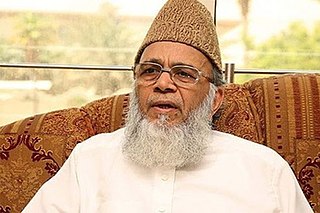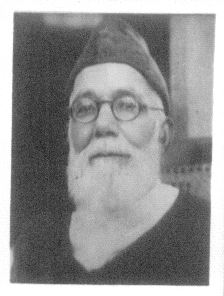
Hezb-e-Islami, lit. Islamic Party, was an Islamist organization that was commonly known for fighting the Communist Government of Afghanistan and their close ally the Soviet Union. Founded and led by Gulbuddin Hekmatyar, it was established in Afghanistan in 1976.

Jamaat-e-Islami Pakistan (JIP), is a Pakistani Islamist political party. It is the Pakistani successor to Jamaat-e-Islami, which was founded in colonial India in 1941. JIP is a "vanguard party", whose members are intended to be leaders spreading party beliefs and influence. Supporters not thought qualified to be members may become "affiliates", and beneath them are "sympathizers". The party leader is called an "ameer". Although, it does not have a large popular following, the party is quite influential and considered one of the major Islamic movements in Pakistan, along with Deobandi and Barelvi.
Khurshīd AhmadPhD, DSc, NI, is a Pakistani economist, philosopher, politician, and an Islamic activist who helped to develop Islamic economic jurisprudence as an academic discipline and one of the co-founders of The Islamic Foundation in Leicester, UK.

Ghulam Azam was a Bangladeshi politician. He served as the Ameer of the Bangladesh Jamaat-e-Islami.
Mian Tufail Mohammad was a Pakistani religious leader, lawyer, Islamic theologian, and former Secretary General and Emir of Jamaat-e-Islami Pakistan party.
The Islamic Foundation is Jamaat-e-Islami's research and publishing house in the United Kingdom. It was established in 1973 by two high-ranking Pakistani activists of Jamaat-e-Islami, Khurshid Ahmad and Khurram Murad. Its objectives are to research into the implementation of Islam in the modern world, to project the image of Islam in Britain and Europe, and to meet the educational needs of Muslims.
Human Rights in Islam is a 1976 book written by Sayyid Abul Ala Maududi, the founder of Jamaat-e-Islami.
Qadiyani Problem is a 1953 book written by Pakistani scholar Abul A'la Mawdudi. "Qadiyani" is a slur used to attack members of the Ahmadiyya movement.
The Objectives Resolution was adopted by the Constituent Assembly of Pakistan on March 12, 1949. The resolution proclaimed that the future constitution of Pakistan would not be modeled entirely on a European pattern, but on the ideology and democratic faith of Islam. The resolution, in its entirety, has been made part of the Constitution of Pakistan under Article 2A

Khurram Murad was a Pakistani scholar of Islam.

Abul A'la al-Maududi was an Islamic scholar, Islamist ideologue, Muslim philosopher, jurist, historian, journalist, activist, and scholar active in British India and later, following the partition, in Pakistan. Described by Wilfred Cantwell Smith as "the most systematic thinker of modern Islam", his numerous works, which "covered a range of disciplines such as Qur'anic exegesis, hadith, law, philosophy, and history", were written in Urdu, but then translated into English, Arabic, Hindi, Bengali, Telugu, Tamil, Kannada, Burmese, Malayalam and many other languages. He sought to revive Islam, and to propagate what he understood to be "true Islam". He believed that Islam was essential for politics and that it was necessary to institute sharia and preserve Islamic culture similarly as to that during the reign of the Rashidun Caliphs and abandon immorality, from what he viewed as the evils of secularism, nationalism and socialism, which he understood to be the influence of Western imperialism.

Syed Munawar Hasan was a Pakistani politician who served as the 4th Emir of Jamaat-e-Islami from 2009 to 2014. He was elected as a member of the National Assembly of Pakistan from Karachi in 1977.

Bangladesh Jamaat-e-Islami, previously known as Jamaat-e-Islami Bangladesh, is a Bangladeshi Islamist political party; it is the largest Islamist political party in Bangladesh.

Chaudhry Niaz Ali Khan was a civil engineer, agriculturalist, and philanthropist who founded "Dar ul Islam Movement" and "Dar ul Islam Trust" in South Asia and "Dar ul Islam Trust" Institutes in Pathankot and Jauharabad. Besides a philanthropist, Niaz was also a civil servant, and a landowner. He was the member of All-India Muslim League and a participant of the Pakistan Movement with the ultimate aim of creating the Muslim-majority areas of British India.
Jamaat-e-Islami is an Islamist fundamentalist movement founded in 1941 in British India by the Islamist author, theorist, and socio-political philosopher, Syed Abul Ala Maududi, who was inspired by the Muslim Brotherhood. It is considered one of the most influential Islamist organisations, and was the first to develop an ideology based on the modern revolutionary conception of Islam. Its founding branch in Pakistan is the nation's largest fundamentalist party.

Mansoorah is a neighborhood located within union council 117 (Hanjarwal) on Multan Road, Lahore, Punjab, Pakistan.
The National Labour Federation (NLF) is national trade union centre in Pakistan. The trade union is the labour wing of the Jamaat-e-Islami party and organises workers in various sectors, including telecommunications, shipyards, transport and manufacturing. It is the third-largest trade union in Pakistan and is not affiliated with any international labour organisations.

UK Islamic Mission (UKIM) is a registered charity and Islamic organization based in the United Kingdom. It was established in 1963 to organise a network of study circles and mosques. The members of the Jamaat-e-Islami movement are said to be active in the organisation.
Maulana Naeem Siddiqui was a Pakistani Islamic scholar, writer and politician. He was among the founder-members of the Jamaat-e-Islami and a close associate of Abul A'la Maududi and Amin Ahsan Islahi.
Mawlana Abdur Rahim was a Bangladeshi Islamic scholar, South Asian politician and the first promoter of Jamaat-e-Islami Bangladesh.









